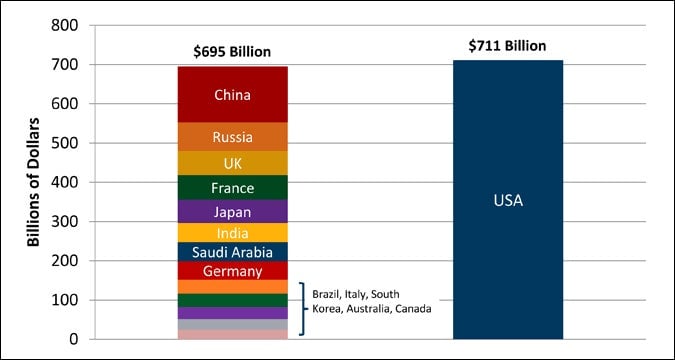Does Chuck Hagel’s nomination mean Obama is ready to take on America’s biggest threat?
When President Obama nominated former Republican Senator Chuck Hagel (here’s his bio) to be his new Secretary of Defense, a host of politically manufactured “controversies” arose: Was he anti-gay? (Probably not.) Is he anti-Israel? (No.) Is he too soft on Iran? (Unlikely.)


When President Obama nominated former Republican Senator Chuck Hagel (here’s his bio) to be his new Secretary of Defense, a host of politically manufactured “controversies” arose: Was he anti-gay? (Probably not.) Is he anti-Israel? (No.) Is he too soft on Iran? (Unlikely.)
The more substantial question in Senate hearings for Hagel’s nomination is whether or not he will campaign to cut the United States’ bloated defense budget.
It’s not that US military officials don’t understand the need for debt reduction; famously, in 2010, Admiral Michael Mullen, formerly the top military commander in the United States, called the national debt America’s greatest national security threat. The country’s military capacity is founded on its economic capabilities, and regardless of America’s military superiority today, it may rest on crumbling foundations. However, the Pentagon’s legendary bureaucracy makes reducing defense funding a slog. The lobbying of defense contractors and the jobs those contractors represent make cuts a political thicket for legislators as well.
But it’s undeniable that the US is spending enormously on national security, only 7% less in real terms than what President Ronald Reagan spent at the peak of the Cold War—and that doesn’t count spending on Iraq and Afghanistan.

The challenge is aligning less spending with a commensurate national security strategy—and that will be Hagel’s job. The ubiquitous debt fighter and billionaire Pete Peterson funded a study (pdf) by the former generals and top diplomats at the Stimson Center outlining a plan to cut $1 trillion from the Defense Budget over the next decade by trimming staffing and changing the way the US projects force abroad, relying on more expeditionary maneuvers rather than long-term bases. That could save a lot and relieve much of the burden on debt, but it would be a political nightmare to enact, requiring full commitment from Hagel.
As a Republican Senator, Hagel called for defense cuts, and as a former soldier who fought in Vietnam and a long-time member of the defense establishment, he may in fact have the credibility to make the case for reductions. There were high hopes for Leon Panetta, the outgoing defense secretary, to cut spending, given his experience in Congress as a budget bean-counter, and he did help shepherd through $485 billion in cuts over a decade. But more recently he has been busy fighting against the ill-advised national security cuts included in the fiscal cliff. To do more, Hagel will need to articulate a different defense footprint for the United States—starting when he comes before the Senate.